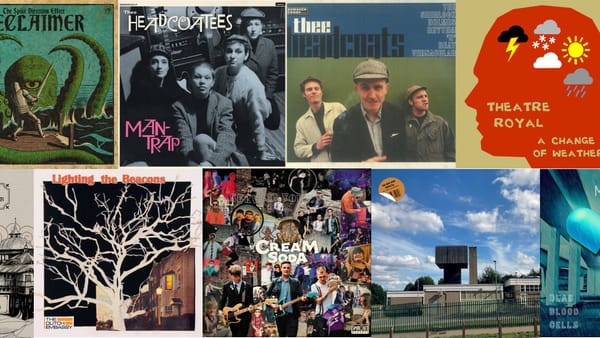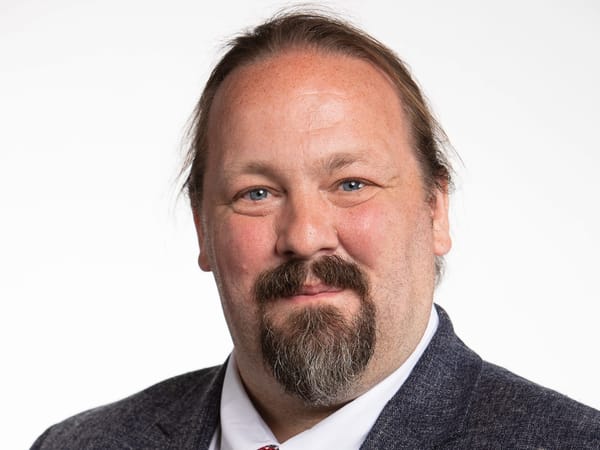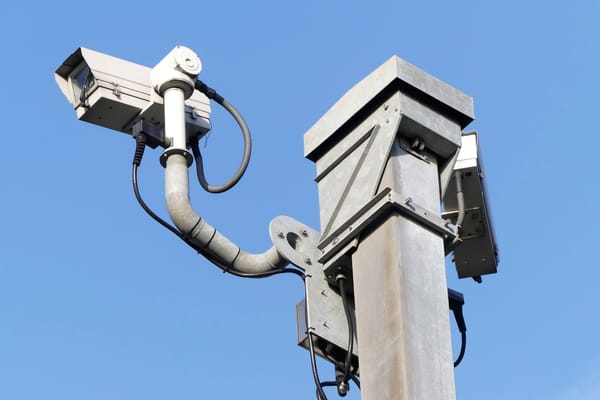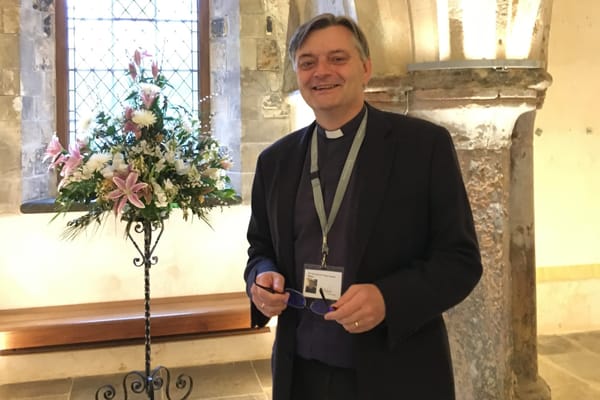'I can’t really write music that goes with the voice"
What Steven asked Stuart Turner, singer-songwriter and biomedical scientist
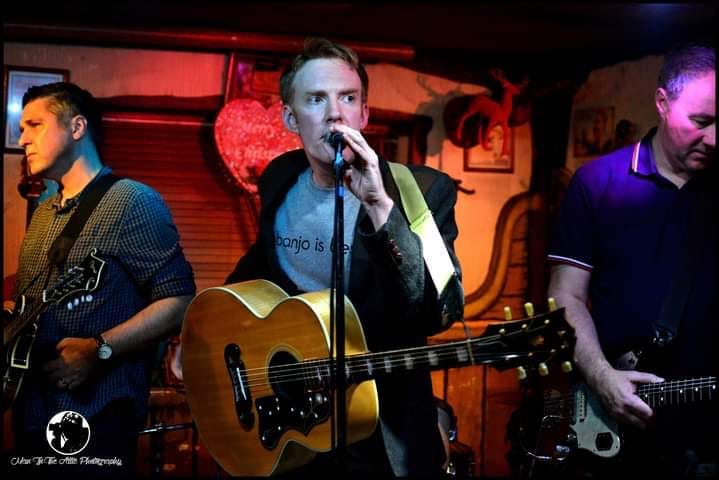
Stuart Turner is a well-known face in the local music scene. Steven met him at the Nags Head in Rochester to discuss what brought him to Medway, why he sings the way he does, why he wrote music about one red mitten, and the thorny issue of good gig venues in Medway.
Nominations are open in the Pride of Medway awards if you can think of anybody providing a community service by providing you with a weekly insight into people with a connection to Medway.
As usual, our Sunday interviews are paywalled about halfway. There’s a lot to get stuck into for free readers, but if you want to keep going and support our work, please consider upgrading your subscription.

Where were you born?
I was born in the Royal Victoria Hospital in Bournemouth, a long time ago. It’s not there anymore. They pulled it down and the building they pulled it down to build has been pulled down.
What jobs did your parents do growing up?
My father was a welder. He hurt his foot in an industrial injury and moved into selling welding equipment for various companies, eventually his own company, but he was bad at that. He was good at giving people equipment on the tick, but not good at collecting the money afterwards. He ended his working life working in social care, making house calls. My mother, I’m not sure if I’m allowed to say. It might be an official secret. She was an auditor for the Inland Revenue. I have actually had to sign the Official Secrets Act because I worked as the post boy in the Inland Revenue one summer. Even giving that away might be against the Official Secrets Act.
This whole interview might get…
Redacted in the interests of national security.
Who knew the post could be so exciting?
It wasn’t, but I’m not allowed to talk about it.
How did you find school and university?
Where I did most of my schooling was odd because my parents moved to North Dorset, and at that time, people had lived for generations. It was initially, you get it with any school environment when you are the new kid, but new kid status stayed for the entire time until I left (laughs). It was very rural, quiet, not many people. I discovered music at an age where I had no access to it at all. Not aware of anything except your parent’s record collection. When went to the bigger school in town, my parents immediately fixated on the idea that I would start doing drugs. I lost quite a bit of weight because the moment I was out of school at lunchtime I was spending my lunch money on records at Woolworths. My parents became obsessed with the idea that I was spending lunch money on heroin. Always heroin, straight to an intravenous injection of hard drugs. Convinced of it. My 18th birthday, I had a party and got smashed off my head. My parents stormed in at midnight and threw everybody out. It was a sanctioned party, but they found a friend of mine was into wargaming and Dungeons and Dragons. They had found a paintbrush cover, and Dad immediately jumped to the conclusion that it was a cover from a syringe, and we were all jacking up in his front room.
What did you specialise in at sixth form?
I went to sixth form in the New Forest. When I was 15, I wanted to be an archaeologist. My mother talked me out of it on the grounds there was no money in it, and I would need to do science. I showed her (laughs) that there’s no money in that either. I did A-levels in Chemistry, Physics, and Maths. It was one of those things where at no point was it discussed what my intentions were. It was only ‘You are going to university.’ It was just what we did.
What did you study at university?
Chemistry. I was very focused on being a student and I failed my final year very badly. So badly I was told I had to retake if I was to get any type of degree at all. I left without a degree. It was at that time that I started questioning what I wanted to do (laughs).
How did you end up in the Medway Towns?
I came to university in Canterbury in the 90s and for reasons of employment, I gradually moved to Ashford, and then I met a girl who lived on the edge of Chatham.
What was your first full-time job?
Care assistant. I was working 70-hour weeks. I worked and supported my girlfriend whilst she studied her Master’s. I had a motorbike crash on my Vespa and smashed my arm. Broke my elbow in about three places, and I ended up with voluntary redundancy because I couldn’t work. I looked around for jobs and ended up in my now 26-year career as a medical laboratory assistant. Purely because I enjoyed the job interview.
What is your current official occupation?
A biomedical scientist. A histopathologist.
A what?
Histopathologist. From the Greek Histos, it’s the study of tissue architecture. Predominantly it is looking at cancer diagnosis from biopsies. I drifted into it. I was applying to jobs in the Kent Messenger, and I got offered three jobs on the same day. It was this or assistant French polisher or classroom assistant in a special needs school. I was in the role for two weeks when they asked if I wanted to try again at a degree. This time I didn’t do the student thing, I did the study thing instead. I came out with a 1st in biomedical science and went on to do a Master’s in cellular biology.
Your mum’s idea of a science career worked out in the end.
Sort of, just not the money thing.
What additional roles, paid or unpaid, do you do?
Have you been talking to my mother? Are you trying to get me to declare something? Since 15 I have constantly been writing and recording music. I was involved with various pretentious poetry things, that carried on into more direct lyric writing eventually. It wasn’t really until I moved to Medway that music started to seem achievable. Before that, it was something I did for shits and giggles. Here it is more than that, but less than an income. It’s bizarre. When I started doing solo acoustic gigs, and I started getting paid for them and started thinking ‘Maybe I could do this for a living.’ Thinking how much I will need to be able to do this, and at the time my overheads were very low. It seemed possible, and then I spent a week trying to get gigs throughout the country. At the end of that I realised no, this is not achievable. It is something that is easier here. There’s an alchemy here.
What musical instruments do you play?
After seeing the film Crossroads, starring Ralph Macchio, whenever that was, I took up the harmonica. As a result of that and a school trip to Berlin, a harmonica was purchased in East Berlin. I became fixated on playing that perfectly, but there wasn’t a lot of opportunity for unaccompanied harmonica players. Certainly not in the North Dorset area. I wanted to get better. My Dad had a bell-ringing accident. He didn’t let go of the rope in time and shot 30ft up in the air, cracked his head on a beam, dropped and nearly broke his spine. At the time he was advised that giving up golf was a good idea. He swapped his golf clubs for a Stratocaster copy. He learnt how to play the theme from the Third Man and then put it away in the corner. I thought if I learnt a few chords on the guitar, I could use a tape recorder to record backing track and practice harmonica over the top of it. The next thing you know you are playing the guitar through sixth form. I had friends who played, and I picked up bits from them. With a friend, we formed a busking duo. Never made any money as we only went out twice, but we practiced a lot. Him on the guitar and me croaking lyrics into the harmonica. It was odd. That was the second band I was in. The first was during fifth form. A bunch of kids who could actually play formed a cover band, and so a bunch of students who couldn’t play formed another band called ‘Loud Sound’. We really couldn’t play. It was terrible but if you are really into music, play it, and never let inability stand in your way.
What bands or groups are you involved with currently?
The first band I had in Medway was Keratin. We played a lot of London gigs for no money. Where we were told if we brought 20 people we would get a cut of the door, knowing full well it wouldn’t happen. It helped to develop an understanding of what works live. I went from that to a lot of solo gigs, the acoustic guitar thing, but it wasn’t always popular due to my idiosyncratic singing voice. The people who liked it really liked it, and one of them was Robbie Wilkinson from what is now The Long Weekend. He offered to do some gigs together, and out of that came Stuart Turner and The Flat Earth Society as a joke name, because it was just two of us. At the time I had no idea there was any political implication, complete naivety, but as the music spread, we said it was ironic. It is now on permanent hiatus. We ended up on a bill with solo Bob Collins, who had volunteered to play guitar with us. It went well, and he learnt the set and joined us in recording a record.
I found myself getting more and more affected by negative reviews, which focused on my voice. I started writing parts for female vocalists and ended up working with Rachel Lowrie. That was the direction of travel. I was trying to step away from singing in a group with my name in it. We finished the sixth and final Flat Earth album just before the first lockdown. It was at that point only available as a physical thing. Implicit Narrative was a conceptual piece, with an implied narrative that was running through. A lot of time was spent on the concept, and then covid killed it. The digital copy was kept by one person at the record label, who was due to upload it when he went back to work, which never happened. It’s still available should anybody want it, including some of my best writing. I had been doing that band for 12 years, and I just felt that it was time to do something else. About five years ago I joined These Guilty Men on guitar. I drunkenly volunteered myself for the role of lead guitar. Out of that, my playing has come along a lot because I could focus just on that. I was sick of being jealous of others’ perceived success, people doing similar but being better received, and doing gigs. I found myself now wanting to do music, but if there is no audience there is no justification for the time required.
You first described your singing voice as idiosyncratic and have got more and more disparaging about it. Why is your singing voice distinctive and so different to your speaking voice?
Yeah, it is a factor in critical opinion. I can sing exactly like my speaking voice, but I can’t do it loudly or for very long. I was diagnosed with thyroid and throat cancer when I was 25. I had a total thyroidectomy and I have a lovely scar across my throat. The thyroid gland is like a bow tie across your voice box. When I speak, my voice hasn’t changed significantly. If you project and sing from your diaphragm, you are protecting and look after your voice. You can control and project with more authority. Post-operation when I started projecting my voice it started roaring, and I thought at first that’s quite interesting in a Tom Waits way. Unless you are doing that genre of music, people aren’t used to it, and I can’t really write music that goes with the voice. You end up writing stuff that is increasingly unsympathetic to your ability to sing.

